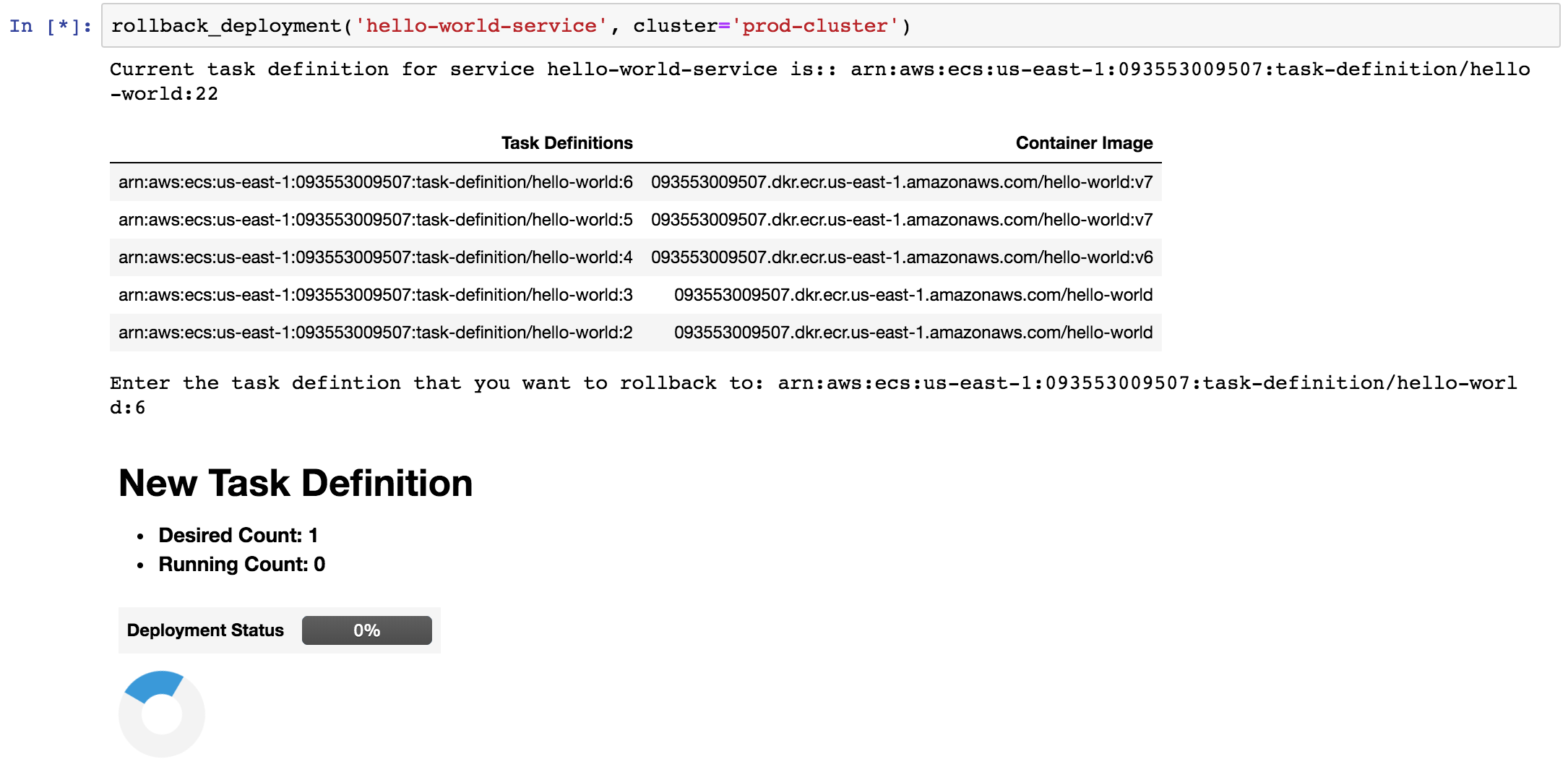Elastic Container Service (ECS)¶
-
rollback_deployment(service, **kwargs)¶ Quickly rollback an ECS service to any prior version. This method first communicates with ECS to retrieve rollback candidates (prior task definitions that you can rollback to). Performs a rollback deployment to a version that you select. Shows deployment progress.
Parameters: - service (
str) – The name of your ECS service. - **kwargs – These are optional. See below.
Keyword Arguments (Optional): - cluster (
str) - Name of the ECS cluster to which the service belongs. If the cluster name is not given, ECS uses default cluster. We highly recommend putting your services inside clusters and not using default cluster unless you are just experimenting.
- cluster (
- aws_access_key_id (
str) - AWS access key of an IAM user to call ECS APIs. Defaults to environment variable
AWS_ACCESS_KEY_ID. Can be overwritten per method by supplying this keyword argument.
- aws_access_key_id (
- aws_secret_access_key (
str) - AWS secret access key of an IAM user to call ECS APIs. Defaults to environment variable
AWS_SECRET_ACCESS_KEY. Can be overwritten per method by supplying this keyword argument.
- aws_secret_access_key (
- aws_region (
str) - AWS region where the service resides. Defaults to environment variable
AWS_REGION. Can be overwritten per method by supplying this keyword argument.
- aws_region (
Examples: from rubix.aws.ecs import rollback_deployment rollback_deployment(service='xyz-api', cluster='prod-cluster')
Sample Usage and Output: 
- service (
-
get_latest_deployment_status(service, **kwargs)¶ Retrieve metadata of last deployment on your ECS service. Metadata includes deployment time, desired/pending/running counts, task definition etc.
Parameters: - service (
str) – The name of your ECS service. - **kwargs – These are optional. See below.
Returns: dict – See response section below.
Keyword Arguments (Optional): - cluster (
str) - Name of the ECS cluster to which the service belongs. If the cluster name is not given, ECS uses default cluster.
- cluster (
- aws_access_key_id (
str) - AWS access key of an IAM user to call ECS APIs. Defaults to environment variable
AWS_ACCESS_KEY_ID. Can be overwritten per method by supplying this keyword argument.
- aws_access_key_id (
- aws_secret_access_key (
str) - AWS secret access key of an IAM user to call ECS APIs. Defaults to environment variable
AWS_SECRET_ACCESS_KEY. Can be overwritten per method by supplying this keyword argument.
- aws_secret_access_key (
- aws_region (
str) - AWS region where the service resides. Defaults to environment variable
AWS_REGION. Can be overwritten per method by supplying this keyword argument.
- aws_region (
Response: - id (
str) - The ID of the deployment.
- id (
- taskDefinition (
str) - The most recent task definition that was specified for the service to use.
- taskDefinition (
- desiredCount (
int) - The most recent desired count of tasks that was specified for the service to deploy or maintain.
- desiredCount (
- pendingCount (
int) - The number of tasks in the deployment that are in the PENDING status.
- pendingCount (
- runningCount (
int) - The number of tasks in the deployment that are in the RUNNING status.
- runningCount (
- createdAt (
datetime.datetime) - The Unix time stamp for when the deployment was created.
- createdAt (
- updatedAt (
datetime.datetime) - The Unix time stamp for when the service was last updated.
- updatedAt (
Examples: from rubix.aws.ecs import get_latest_deployment_status get_latest_deployment_status(service='hello-world-service', cluster='prod-cluster')
Sample Usage and Output: 
- service (